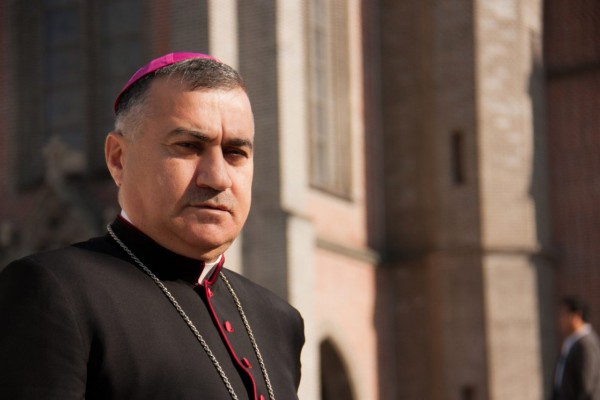
Archbishop Bashar Warda of Erbil (©Aid to the Church in Need)
ishtartv.com - heraldstaronline.com
Feb 13, 2018, PAUL GIANNAMORE
Archbishop Bashar Matti Warda, the Chaldean archbishop of
Erbil, visited the Franciscan University of Steubenville Monday and delivered a
speech about the ongoing persecution. The university announced a scholarship
for a Middle Eastern student to study at Franciscan, with the goal of providing
leaders to return to the Middle East for the material and spiritual transformation
of the region.
“Despite all the difficulties and persecution that the
Christians are suffering, there is still the chance to speak about hope. You
might say hope against hope,” Warda said in an interview Monday morning.
In 2003, there were an estimated 1.5 million Christians
living in Iraq. The number is down to between 175,000 and 300,000, according to
Warda’s diocese. Thousands of refugees poured into his diocese at the height of
the conflict.
He founded the Catholic University in Erbil in 2015.
He said American Catholics need to know the church is one
body.
“If I suffer, you suffer. If you suffer, I will suffer.
Second, they need to know there are still persecuted Christians. You need to
pray for the Christians. You need to read about their story. You need also to
keep raising awareness about their stories. Donate if you can,” he said. “If
you have some time to come and visit us and to be with us, this would leave you
with a spirit of knowing why you’re a Christian.”
Aid to the Church in Need USA and the Franciscan University
of Steubenville have partnered for the Middle Eastern scholarship. Warda said
it is important.
“Once we started the process of building a university and
Catholic schools, we needed a trained, well-experienced personnel in the field
of Catholic education to teach us, to guide us through this process,” he said.
“When it comes from a university, which also faced difficulties and a crisis
concerning the Catholic identity, I would say we are in a similar situation in
that sense. I’m really grateful for this opportunity that we will be blessed by
people who will be willing to guide and help our students, to train them for
awhile and to send them back again to home and rebuilding the church.”
The Islamic State has forced thousands of Iraqi Christians
to convert to Islam, pay exorbitant taxes or be executed. Many fled to the area
around Erbil, filling Warda’s diocese with Christians in flight.
Even with the departure of ISIS, many do not want to return
to their former homes and parishes. Warda said there aren’t many homes to
return to for the displaced families, with as many as 14,000 homes and basic
infrastructure destroyed in his region. He respects those who return and those
who are still afraid, and his parishes continue to aid them. Many remain in
Turkey and Jordan and Lebanon, too.
“Really, we’d love them to stay in Iraq,” he said.
He said homes are needed first. Schools and hospitals are a
priority.
“Last, we’d be thinking of restoring churches,” he said.
Church buildings aren’t “the church,” but the people are.
Warda said persecution isn’t just about what happens with
wars and violence.
Warda said a Chaldean bishop in Australia told him, “Bashar,
you know, to live in the Middle East as a Christian, it’s much easier for you
than to be a Christian in Australia today. Everything (in Australia) is
attacking you and it’s not killing the body. It’s killing the spirit.”
He said his friend told him of efforts to preach about a gay
marriage referendum and being rejected.
“There (in the Middle East), you are persecuted because you
are a Christian. Here, you are being told ‘We tolerate you as a Christian but,
please — keep silent,'” he said. “You cannot compromise. You cannot be a quiet
person.”
He said a personal relationship with God is the way to stay
alive.
Facing persecution and its results, Warda said, there are
days where it’s possible to feel there’s nothing left to say. He was ordained
in 1993, and had spent compulsory service in Saddam Hussein’s army in his
younger days. His entire priesthood has occurred during time of war through the
Middle East.
“But at the end of the day, the hands of God are working in
a way that you can’t really think about,” he said. “When I think about the last
few years, there were so many nights where we slept with problems. What am I
going to do with 700 families who are in the cathedral? What are we going to do
in this area?”
He said in Erbil, the church isn’t just a “point of
reference.” It’s expected to be an active participant in all kinds of
humanitarian works.
“If you need a job, you go to the bishop. He should find you
a job. If you have a problem with any person, you go to the bishop. If you have
problems, you don’t go to the police station. You go to the bishop,” he said.
“For anything, it’s the bishop.”
Even the government asks the church to intervene in matters.
But, he said, hope intervenes.
“We wake up and there is a call from a friend, from someone
who wants to help, or an e-mail of approval for a project. Thank God, we’ve
been blessed by the hands of love by Aid to the Church in Need, the Knights of
Columbus, Catholic Relief Service” and others, he said. “So many people are
praying for us. The list is large.”
|